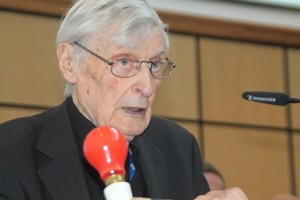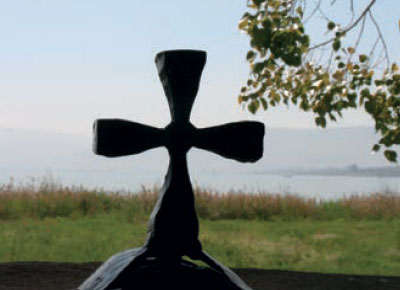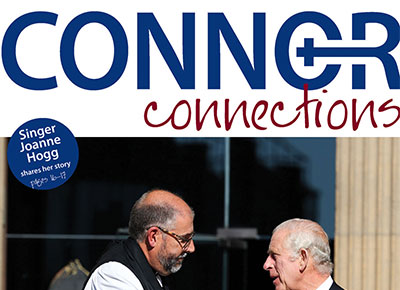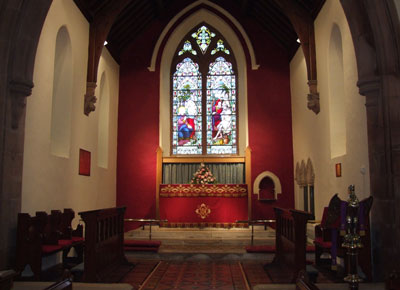Edgar Turner – a man who saw God in all people
Canon Edgar Turner, who died on April 2 aged 96, was a man who ‘saw God in all people,’ mourners at his funeral on April 7 heard.
The service was held in St George’s Parish Church, Belfast, where Canon Turner had been rector for 32 years prior to his retirment. The Address was given by the Venerable David Pierpoint, Archdeacon of Dublin, a close friend of the late Canon who held the honorary title of Principal Registrar of Connor.
The full Address by the Venerable David Pierpoint, Archdeacon of Dublin follows:
St George’s Parish
High Street, Belfast
Robert Edgar Turner
Priest
1920 – 2016
Jesus Said – “Everyone who hears these words of mine and does them
shall be like a wise man, who built his house on the rock.
The rains fell and the floods rose, and the winds blew and beat upon that house;
but it did not fall; because it was founded on a rock. (Matthew Ch 7 vs 24 – 25)
When Jesus calls his disciples, he underlines what type of people he has in mind. Not at all the same sort of people. Some are poor in spirit, even mourners. Others are meek or merciful. There are those who hunger and thirst after righteousness. There are the pure in heart and the peacemakers. But whatever their individual talent, there ought to be one thing that is common – that they seek first, the Kingdom of God and his righteousness; Their houses are built on a rock and not on sand.
All these words about discipleship are Jesus’ words, and are remembered because they were true of Jesus; so that when the rains fell and the floods rose and the winds blew, he did not fall, because he too was founded on a rock, the rock of his heavenly Father.
In latter months, Edgar became a little frail and health failed him and he was supposed to be confined to his home, but just a week or so ago, was out for coffee and visiting friends before his enforced admission to hospital. Yet, even that didn’t prevent him from following the Northern Ireland soccer international last Monday week on the radio and in the company of his rector, Robert Jones. Little did we know when he first became ill that he was not long for this world and would go to God peacefully and without fuss, just as he had lived. When the rains fell and the floods rose and the winds blew and beat upon that house, it did not fall; for it was founded on a rock. And that rock was Christ. During Edgar’s ministry, the rains did fall, the floods certainly rose and many winds beat upon him but he carried on regardless, with Christ at the centre of everything he undertook and achieved.
Born in Derry in 1920, Edgar grew up with his parents on Beechwood Avenue. Like most boys, when he was off sick from school, he didn’t take to his bed but rather played outside. The story is recounted that on one such occasion, his mother, who at the time could not afford coal, challenged the coalman for delivering coal to her back yard. The coalman went on to explain that her son had saved his business and this was his way of paying something back to the family. On closer investigation, she discovered that the horse pulling the cart could have slipped on ice on the hill outside Edgar’s house so the coalman asked the young Edgar to sit on the horse’s neck to prevent it from rearing up which with the cart attached could have broken its back. Edgar duly obliged and the coalman went off to get some help. Arriving back some time later, the coalman discovered Edgar still clinging onto the horse’s neck. Everything worked out well and Edgar saved the day. This attitude of dedication to the task set for Edgar was repeated many times throughout his life and especially his priestly ministry. It is also noteworthy that he hadn’t told his mother of his selfless act.
During those early years, Edgar even visited the red plane in Gallagher’s field outside Derry city which had been flown across the Atlantic by Amelia Earhart. When asked by others what he thought about this, his response was one of amazement that he had ridden in a motorcar!
Educated in Foyle School, Derry, Edgar then moved to Magee University and on to TCD where he studied modern languages and theology. He was denied a double first by Archdeacon Raymond Gordon Finney Jenkins (Jenky) because he hadn’t studied six of the thirty two chapters of Genesis in Hebrew. He would later have the last laugh when on a seminar in Jerusalem, he and Joan visited a local restaurant and bought a beautiful bottle of wine. They observed a number of others rolling a barrel up the steep incline to the retreat house. The barrel of wine which Jenky, in his best Hebrew had purchased turned out to be local grapefruit juice. So much for Jenky’s Hebrew. Edgar said he would take that bottle of wine with Joan over a first, any day. The first in modern languages was foiled by a series of events which I will not go into at this time.
While at Trinity Edgar joined the Bray cycling club and this sport kept him fit cycling extensively throughout Ireland, England, Wales, France, Germany (before the war) and Switzerland.
On completion of his degree Edgar travelled to Lincoln Theological College which he has often said were the happiest of times. He had placements in hospital, prison and school chaplaincies as well as learning the craft of book-binding. He declined offers of curacies in Ireland preferring to remain in England where he trained for ministry. After a year, he was ordained as deacon for the parish of Kings Heath, in Birmingham where he remained for six years before returning to become Dean of residence at Queens. It was during his time at Queens that Edgar met Joan, having been the person she was told to find to help her out when her grant cheque was not forthcoming.
In 1951, the then bishop of Connor, appointed Edgar to St George’s only at his institution to give him the express instructions that the church should be closed. That was like a red rag to a bull and the rest as they say is history. Through years of bomb damage, violent threats, anti-ecumenical protests and ultimately rejuvenation, Edgar Turner remained faithful to the parishioners of this place and his church until his retirement in 1990.
In 1962, he married Joan followed by the birth of Kate and Justin. Family life as with any rectory family was often disrupted by pastoral emergencies and in the Turner’s case, the ongoing troubles in Northern Ireland. On one occasion when the Rectory suffered severe damage because of a bomb outside their home, Edgar still managed to attend a church meeting once he knew his family and neighbours were safe. As a family, they learned to cope but still had time for holidays in the UK and France. On one holiday, they visited the war graves in Normandy where Edgar instilled in his children a sense of equality taking them to visit both the British and German war graves. Edgar was determined to show that regardless of which side people had fought, they were at all times God’s children. Such advice and recognition of humanity has never been forgotten. In fact when Edgar retired from Queen’s the Chancellor commented that he had never before seen everyone from himself to the kitchen staff and cleaners present to acknowledge a man who acknowledged everyone, regardless of who or what they were.
His talent for getting down and dirty was evident in his care of this church, he wasn’t just a man with a voice and brain and sociability; he could clean drains, erect precarious scaffolding to fix and change light bulbs, climb onto the roof to fix slates and much more. But above all else, he was a man of devotion and moral character, of self-discipline and of prayer. Of these, the Church of Ireland has been witness and a beneficiary. He made this parish of St George his family home where ministry and family life went hand in hand. He officially retired in 1990. That in itself is somewhat a joke! For he was from far from inactivity. Right up to the time of his sudden health problems in early March, he was regularly providing advice and help to all who asked for his counsel. Though it must be said, he never forced his opinions on anyone, at least not since 1990! Many of us here today have been on the receiving end of one of Edgar’s answers when a question was put to him. You really needed time on your hands when asking Edgar anything as his considered response was likely to be almost a lecture. Justin reminded me the other evening how he would ask his dad a question, disappear and then leave Kate to listen to the monologue which followed. Later, he would ask Kate to give him a synopsis. Many people know the story of one cleric asking Edgar a question as the enterprise train pulled out of Belfast and still listening to Edgar’s considered response as they arrived in Dublin. Football fans travelling to Slovenia will know this only too well.
The priestly formation in the catholic tradition was very secure under Edgar and he developed a pastoral and teaching ministry of the highest standard which few have surpassed since. His intense conversations left one wondering where they had gone wrong. Such was his passion for correctness in everything. I vividly remember one General Synod meeting a few years ago; Edgar’s drink was sitting on our table for quite a while as he had been asked to give his opinion on some legal matter. I decided he needed some sustenance, so brought his drink over and hovered near this holy huddle. After a few moments, Edgar, turned to me and said, “Do you mind, this is a private discussion”, while at the same time rescuing his whiskey from my hand! That put me in my place but no offence was meant or taken. Yet although he may have seemed severe and occasionally stubborn to people, there were countless numbers who were drawn, not just to Edgar, but to his church and finally to his Lord, many of whom went on for ministry training. All found in this unique and generous man, a deep and carefully considered belief, compelling teaching content to his sermons but perhaps most of all, a profound reverence at the Sacrament of Holy Communion.
Those who stood with him at the altar of this or any church will testify to his absolute absorption in the Eucharist. He never projected himself, rather Christ. I believe it was Archdeacon Jenkins who once wrote “The function of the priest is to draw aside the curtain between God and man, and to lose himself in the folds” Edgar did just that and brought many to faith by promoting the gospel message of love and reconciliation through his ministry and his devotion to the sacraments.
His love and loyalty to the Church of Ireland never wavered though he often became exasperated at the officialdom which slowed down progress. An officious man himself, that part of his life never interfered with his love of this place, his parishioners, his family and the duties of his priestly ministry which he valued more highly than everything else. The following words from an unknown source might well sum up his ministry and the congregation of St George’s which became an extension of his family: Here at this altar the Real Presence, the very Gospel activity of our Saviour, will not fail us. And as our forebears proclaimed Jesus in the broken bread, so we pray that this faith will continue to be ministered and taught fearlessly in this place”.
It would be remiss of me not to mention Edgar’s love of The Beautiful Game, having been a lifelong supporter of Derry City Football Club since its inception in 1928 and of course his close association with the IFA and the Northern Ireland soccer team. Edgar endeavoured to never miss a Northern Ireland home game. For Pat Jennings’s 100th cap, he travelled from a Church meeting in Dublin to find the gates locked! Did this deter Edgar, no! He climbed over the back wall of Windsor Park to get in, such was his determination to be in attendance on such a special night. He was recognised as the team’s oldest travelling supporter even making it to the Faroe Islands last September. As some of you will have read in recent newspaper reports, he was already booked for the European finals in France later this year … all the way to the finals!
Edgar was not just a man who hung around holy people, and this is evidenced by so many gathered here today who have perhaps little or no faith. He never judged people who didn’t believe in God, but saw God in all people.
We mourn and yet we do not mourn. We weep and yet we rejoice – we in the Church and further afield, who are very different kinds of people with many differing gifts and talents – have one thing in common – we have all been touched by the life and witness of Edgar Turner, a Priest of the Church – making us all one body in the fellowship of Christ.
Kate, Justin and Bláithín ministered to him, you loved him and there were prayers and conversations for which I know both he and you are most grateful. I know they would wish me to pay special thanks to the rector of St John’s, Malone Road, Robert Jones who walked with them and Edgar through the darkest of hours over these past number of months. To the nurses and doctors who cared for him both at home and in hospital and his friend, Oliver who visited daily, thank you all for your kindness and compassion.
Yet, we are not the ones who are burying a dad. Kate, Justin and Bláithín mourn so much more than us. Not only have they lost a dad and a father in law, they have lost a friend, a confidant, a mentor and much more besides. When I asked each of them to sum up what Edgar meant to them, they used words, like thinker, teacher, a character, one of a kind but above all a dad. Kate, Justin and Bláithín, please be assured of our prayers for you all at this most difficult time and as you remember all that was good in your Dad’s life as priest and father, may you also be assured of God’s presence as you continue to live your lives as your dad would have wished and the love for all people that he instilled in each of you. His faith was firmly built on the rock of his Saviour Christ. May yours and ours be the same.
Well done, good and faithful servant, receive the reward which God has promised to those who love and serve him.
Robert Edgar Turner: Priest, friend, colleague and above all, Dad;
May you rest in peace to rise in glory. Amen
© Copyright The Church of Ireland Diocese of Connor 2026 | Web Design by LD2.digital





